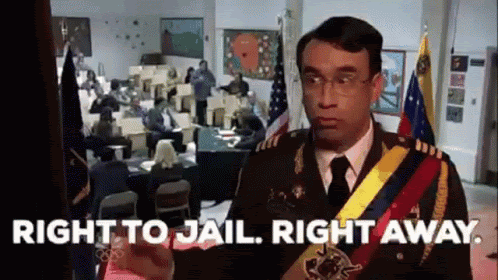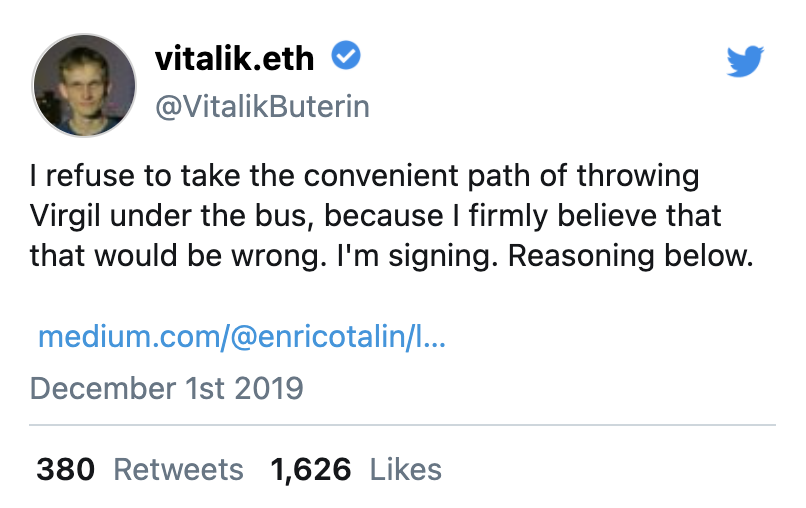Ethereum developer goes to prison
GM, we take the latest Web3 news and translate it into plain old English - so you can stay up to date, without your eyes glazing over.
In today’s edition:
Former Ethereum developer goes to prison for helping North Korea evade sanctions
Web3 might be about to disappear (in a good way)
RESOURCE: What is Web3? Learn in under 9 mins
Bitcoin transactions are down, but mining is getting more competitive. Here's why...
Former Ethereum developer goes to prison for helping North Korea evade sanctions
What's your best guess for the title of this story's (inevitable) Netflix documentary?
Smart CONtracts?
Proof of Work Treason?
NFT: Non-Fungible Treachery?
Here's what happened:
Former Ethereum developer, Virgil Griffith, was arrested in November 2019 after giving a talk at a cryptocurrency conference in North Korea, in April of the same year.
The sentence:
Yesterday, Griffith was given 5-6 years in a US prison and a fine of $100,000 USD for helping North Koreans use cryptocurrencies to evade sanctions.
For reference, this sentence is at the low end of the possible twenty years - which is kinda surprising given what Judge Kevin Castel had to say about him:
“There is an argument that Virgil Griffith is a kind and thoughtful man...but those are not the facts”
“This guy is willing to play both sides of the street as long as he is the center of attention.”
Ouch.
That's the legal equivalent of your mom telling you to 'stop showing off in front of your friends'.
To counteract, here's what Vitalik has to say:
( for those of you playing at home, he created Ethereum)
Web3 might be about to disappear (in a good way)
We tend to harp on from time to time about Web3 infrastructure needing to become 'so easy to use, it's invisible to the end user', in order to gain mainstream adoption.
Which, in all fairness, is much easier said than done. This sort of development takes a good chunk of time, talent and dosh.
That's why stories like this get us all giddy.
The decentralized crypto exchange, Uniswap, have just announced a new venture division that aims to:
"Onboard millions of users into the web3 economy, with the goal of unlocking universal ownership & exchange for all"
Translation: they're going to start giving money to developers with cool/helpful Web3 app ideas and infrastructure fixes.
That'd kind of be like if Apple started funding third party iPhone app ideas.
We love to see it.
Resource of the day
This one's been asked for many times by our readers...What is Web3?
Learn in under 9 mins.
Bitcoin transactions are down, but mining is getting more competitive. Here's why...
This article is dense.
We thought a brief overview of how Bitcoin mining works would be helpful, so here goes...
Step 1.
A bunch of nerds (Bitcoin miners) all compete to solve a complex math problem, using FREAKIN' HUGE computers.
The first miner to solve the problem, wins the right to process a group of ~500 transactions (also known as a 'block').
Step 2.
The winning nerd (miner) processes the block of transactions.
Step 3.
6.25 Bitcoin is pulled from the remaining stockpile of 'un-mined' (or 'yet to be distributed') Bitcoin and given to them as a reward for processing the transactions.
On top of that, they also receive a small transaction fee from each and every user that sent/received BTC in that group of ~500 transactions.
Step 4.
The cycle repeats itself.
Ok, now we've got that covered - what's happening in this article and why's it important?
Well, Bitcoin transactions have gone down - which means there's less money to be made through transaction fees.
But right now, competition between miners is going up.
Which doesn't make sense, until you take into account that miners make waaaay more money from the rewards (6.25 BTC every time) than they do the transaction fees (which change depending on the amount being sent).
This means that even if transactions go down, miners are still incentivized to process as many blocks as they can to get those sweet rewards.
'Wait. Hold your horses. Won't there only be 21 million Bitcoin created and distributed through this mining reward system? And haven't we already given out 19 million of those?'
You are correct! Once all 21 million BTC are mined, the rewards will go away, but the transaction fees will stay.
And because reaching the supply limit of 21 million will most likely push up the price of bitcoin, these transaction fees will become more and more valuable.
Anyway, we might pass out if we think any harder, so we're going to stop writing now.
Happy Hump Day!
Your Daily Dose of Web3
Robinhood finally allows you to buy Shiba Inu, Solana, Polygon & Compound through their app
Tesla, Block and Blockstream team up to mine BTC sustainably
Bank of America predicts dire recession (and says crypto will outperform most other investments)
Ariana Grande's fundraiser, PledgeCrypto, will now facilitate crypto donations
Alright, that’s it for today!
Love to the family,




